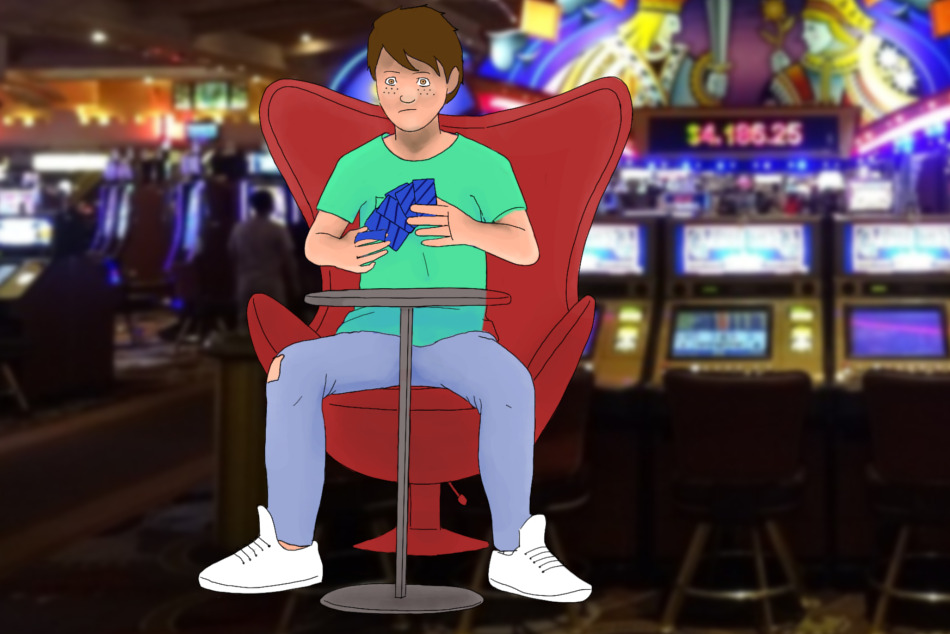Lottery: A tax on people who are bad at maths, Ambrose Bierce.

What is it? Basically, it can be defined as pathological gambling. It is an urge to gamble continuously, an absolutely irresistible impulse to play and place bets despite being aware of its costs, risks, harmful effects, and detrimental consequences, yet sadly, feeling helpless to stop.
There are many form of gambling, many opportunities to fall into this unhealthy behavior, such as mobile gambling, video lottery terminals, slot machines, casinos, bingo, ticket lotteries, charitable lotteries, and online gambling, and almost as many variations, e.g., euromillions, instant lottery, international lottery, blackjack, poker, roulette, horse races, etc.
Videos games act as a pathway to gambling.
Online gambling has been snowballing in the past decades and now, with the rise of mobile gambling, people can gamble in the privacy of their own home without their loved ones even realizing it. The global market for Gambling estimated at US$711.4 Billion in year 2020, is projected to reach a revised size of US$876 Billion by 2026.
The omnipresence of gambling and gambling-like activities (cryptocurrency trading and day trading) has made financial catastrophe a few clicks away for anyone with a phone, The Rise of Mobile Gambling Is Leaving People Ruined and Unable to Quit, vice.com.

How to recognize the signs of compulsive gambling?
You may use the following criteria:
- Excessive tension and excitement about gambling; a state of anxiety and irritability when attempting to stop playing; using gambling as a scape goat rather than addressing their actual problems; using it to relax after a stressful day or to celebrate a special event like a birthday, an anniversary, or a new job; frequent absences from home and work, some of them even neglect their family obligations and children.
- Pathological gamblers spend a lot of time, energy, and money in gambling. They think a lot about the next time they will gamble, about planning their strategy, and how to get more money. They cannot stop gambling when they are ahead and continue to gamble until the last penny is gone. They also have a strong urge to win back the money they have lost in the past.
- They become deceitful and lie about their addiction, and how much time and money they are spending indulging in gambling, especially they lie about their losses 💵.
The terrible consequence of this is that their self-esteem and reputation significantly deteriorate; assets, properties, friends, and relatives are lost because gambling is a very expensive form of entertainment and gamblers betray their friends and relatives just for the sake of winning some money. They will end up facing financial ruin, family breakups, and homelessness. They become thieves, prostitutes, and commit crimes to support their gambling habit. They end up suffering from physical and psychological health problems, such as depression, stress, suicidal thoughts, anxiety, insomnia, poor nutrition, increased caffeine and nicotine consumption, drug abuse, panic attacks, eating disorders, and ulcers.
How can we overcome it?
It is possible to overcome it, like any other addiction, but it is not easy, nothing worthy is. It will take a long and tortuous process. Here are some guidelines:
- Do not download and install betting apps or start playing slot machines, casinos, lottery, etc. They may look innocent, but gambling may end up being an addiction and ruin your life. If you are a regular gambler, just stop betting right now. If you think that you can control it and that it is fun, set a limit on time and money, and stick to it. Gamble only if it is fun!
- Do not increase the amount of money that you spend on your bets.
- Recognize your addiction, realize that you have a very serious problem. As you can read in Gamblers Anonymous’s web site: “Most of us have been unwilling to admit we were real problem gamblers. No one likes to think that they are different from their fellows. Therefore, it is not surprising that our gambling careers have been characterized by countless vain attempts to prove we could gamble like other people. The idea that somehow, some day, we will control our gambling is the great obsession of every compulsive gambler. The persistence of this illusion is astonishing. Many pursue it into the gates of prison, insanity or death.”
- Seek help from a professional and/or an organization devoted to the rehabilitation of compulsive gamblers, such as Gamblers Anonymous (a fellowship of men and women who share their experience, strength, and hope with each other that they may solve their common problem and help others to recover from a gambling problem) and The National Council on Problem Gambling (Our mission is to increase public awareness of pathological gambling, ensure the widespread availability of treatment for problem gamblers and their families, and to encourage research and programs for prevention and education).
- Analyse and solve underlying problems, such as relationship problems, depression, stress, low self-esteem, unemployment, drug abuse, etc.
- Keep control over your budget and pocket money.
- Reorganize your agenda, get involved in activities that foster safe and healthy habits and behavior, and build relationships. Avoid loneliness and boredom!
- Change your lifestyle. Live a more active lifestyle, get out, do more sports and outdoor activities, make new friends, avoid alcohol and drugs, eat a balanced diet, sleep well, try to learn new skills and competences, etc.
- Put yourself on the self-exclusion list to be banned from casinos, bingos, etc.
You should understand that nobody gives money for free. Money is indeed very difficult to earn. Realize that behind an aggressive, persuasive, and ubiquitous advertising, there is a lucrative industry that earns big money because of the immutable laws of Statistics. Sooner or later they always win and get huge profits from your gambling. Therefore, please, do not waste your money, do not ruin your life!





